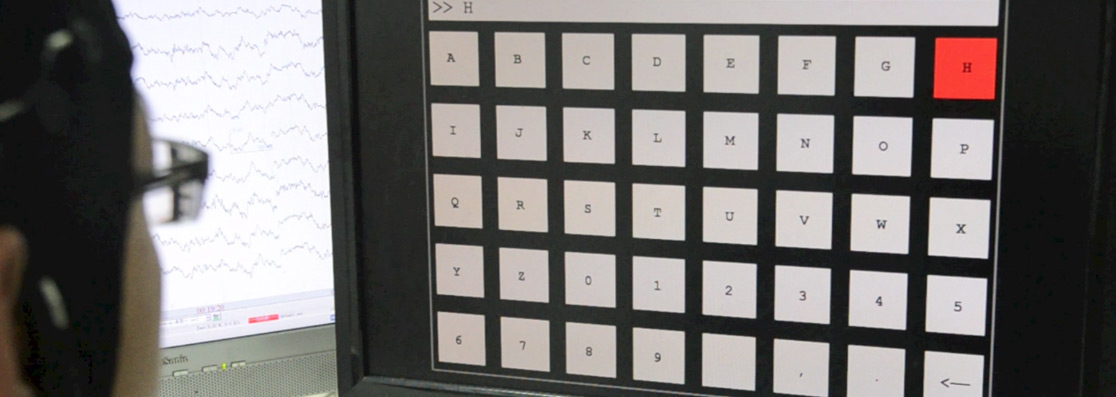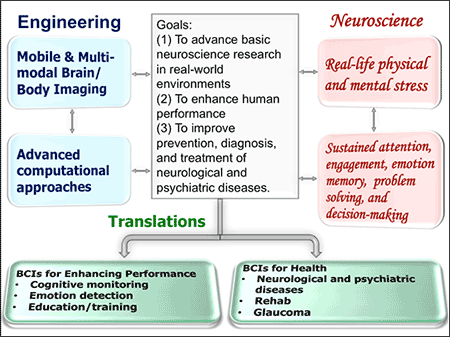
High-speed spelling with a noninvasive brain-computer interface
Research
 Our Goals:
Our Goals:
- To advance basic neuroscience research in real-world environments
- To enhance human performance
- To improve prevention, diagnosis, and treatment of neurological and psychiatric diseases.
Our overarching vision is to create entirely new ways to enhance the lives of patients with neurological/psychiatric disorders and their families. (see figure to right for details)
Real-World Neuroimaging
My team and I develop and validate non-invasive, mobile and multi-modal brain/body imaging, along with advanced computational approaches, to perform real-world neuroimaging and brain-computer interfaces (BCI). We have successfully consolidated our expertises and achievements in circuit design, micro-fabrication, signal processing algorithms, control & robotic engineering, real-time embedded and DSP software development and virtual-reality techniques to build a powerful BCI platform that we expect to have immense future impacts on clinical research and practice in neurology, psychiatry, gerontology, and rehabilitation medicine.
We realize that most research in neuroscience has been performed in a well-controlled laboratory setting, which might not translate to the highly dynamic real world, filled with ever-changing physical and cognitive circumstances. Therefore, their goal is to advance basic neuroscience research in real-world environments. Based on the neuroscientific knowledge gained from this research, we can then create fundamental translational principles to guide neuroscience-based research and theory in complex operational settings. It is hoped that this knowledge can ultimately be used to enhance human performance and resilience to physical and mental stress (e.g. cognitive monitoring, emotion detection, education/training), and to clarify neuropathogenic processes and create novel strategies to improve the prevention, diagnosis, and treatment of neurological and psychiatric diseases.
Some of our projects include: nGoggle (combining virtual reality and BCI technologies to assess visual function and Glaucoma); Advancing mobile & wireless EEG/BCI technology to improve clinical research and practice in neurology, psychiatry, gerontology, and rehabilitation medicine; Problem solving, decision-making, and visual search in a VR Escape Room; BCI for drowsiness/inattention detection; User interface using brainwaves; and High-speed spelling with noninvasive BCI. Please click here to see demos of some of these projects.
International Research Team
Our International Research Team includes:
- University of Technology Sydney, Australia: Chin-Ten Lin (AI and Neural Engineering)
- UC San Diego, USA: Scott Makeig (Computational Neuroscience), Gert Cauwenberghs (Bioengineering), Eduardo Macagno (Biology), William Mobley (Neuroscience), and Ming Tsuang (Psychiatry)
- The Salk Institute, USA: Terrence J. Sejnowski (Computational Neurobiology and Neuroscience)
- Duke University, USA: Feipe Medeiros (Ophthalmology)
- Nat’l Chiao Tung University, Taiwan: Hsiao-Ching She (Education), Li-Wie Ko (Biological Technology), and John Zao (Cloud/Fog Computing & Security)
- Nat’l Central University, Taiwan: Jeng-Ren Duann (functional Neuroimaging)
- Nat’l Sun Yet-Sen University, Taiwan: Yuan-Pin Lin (Electrical Engineering)
- Nat’l Yang-Ming University and Veteran General Hospital-Taipei, Taiwan: Shuu-Jiun Wang (Neurology) and Tung-Ping Su (Psychiatry)
- Tianjin University, China: Dong Ming (Bioengineering) and Minpeng Xu (Bioengineering)
- Academia Sinica, Taiwan: Arthur Tsai (functional Neuroimaging) and Michelle Liou (Statistics)
- Chinese Academy of Sciences, China: Yijun Wang (Bioengineering)
- Tsinghua University, China: Xiaorong Gao (Bioengineering) and Shangkai Gao (Bioengineering)
- Technical University Berlin, German: Klaus Gramman (Psychology)
- ABC Federal University, Brazil: André Fonseca (Mathematics)